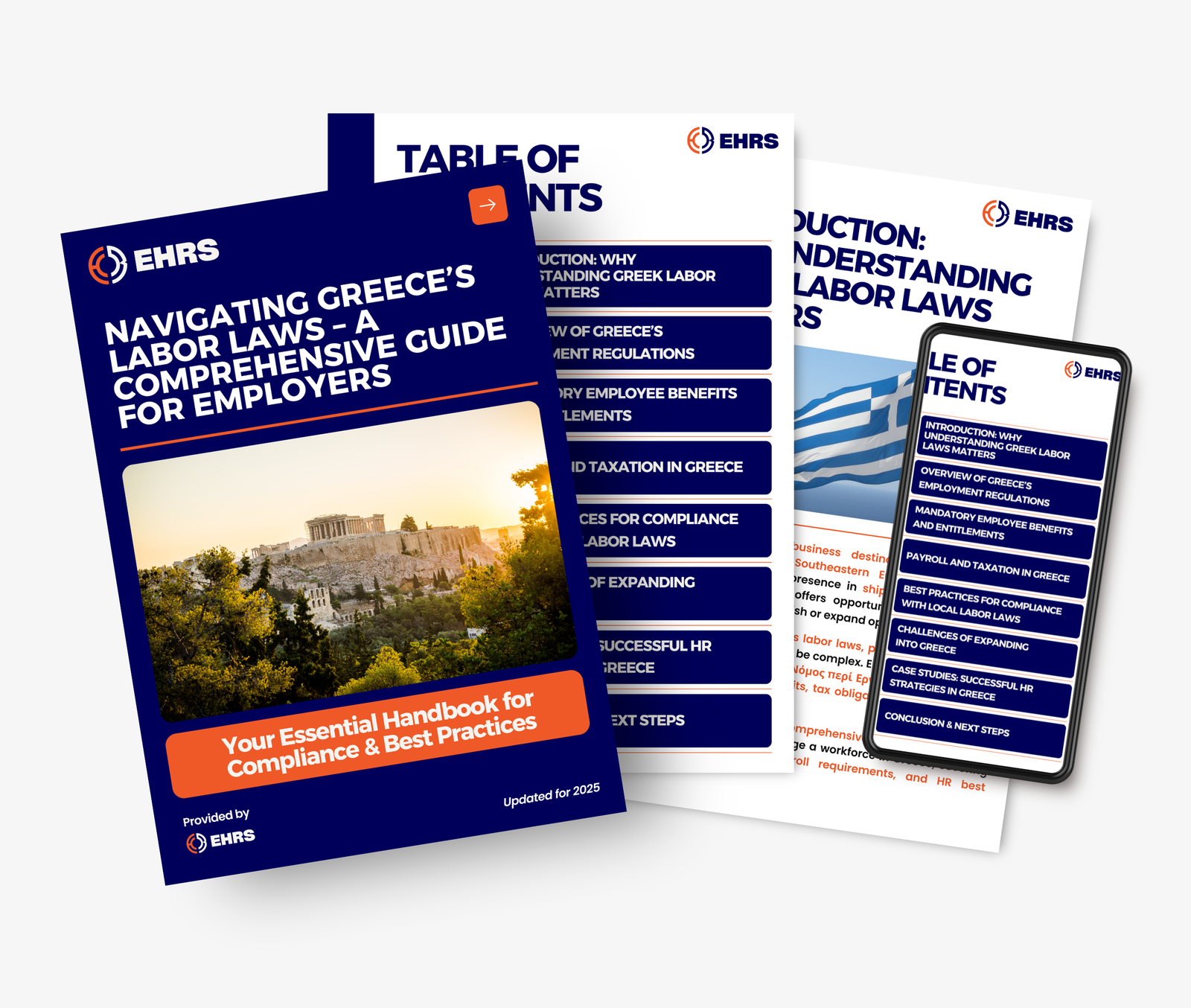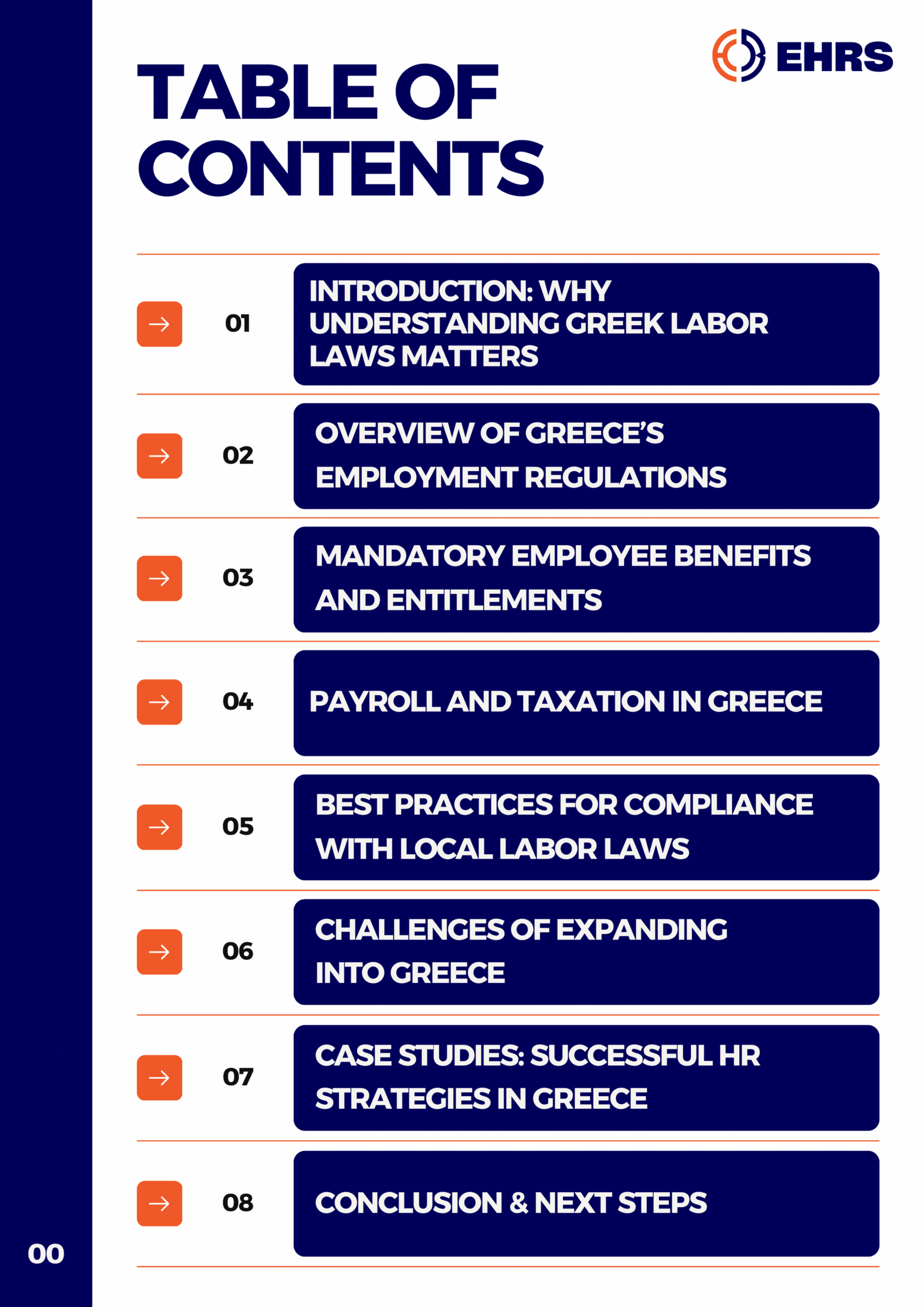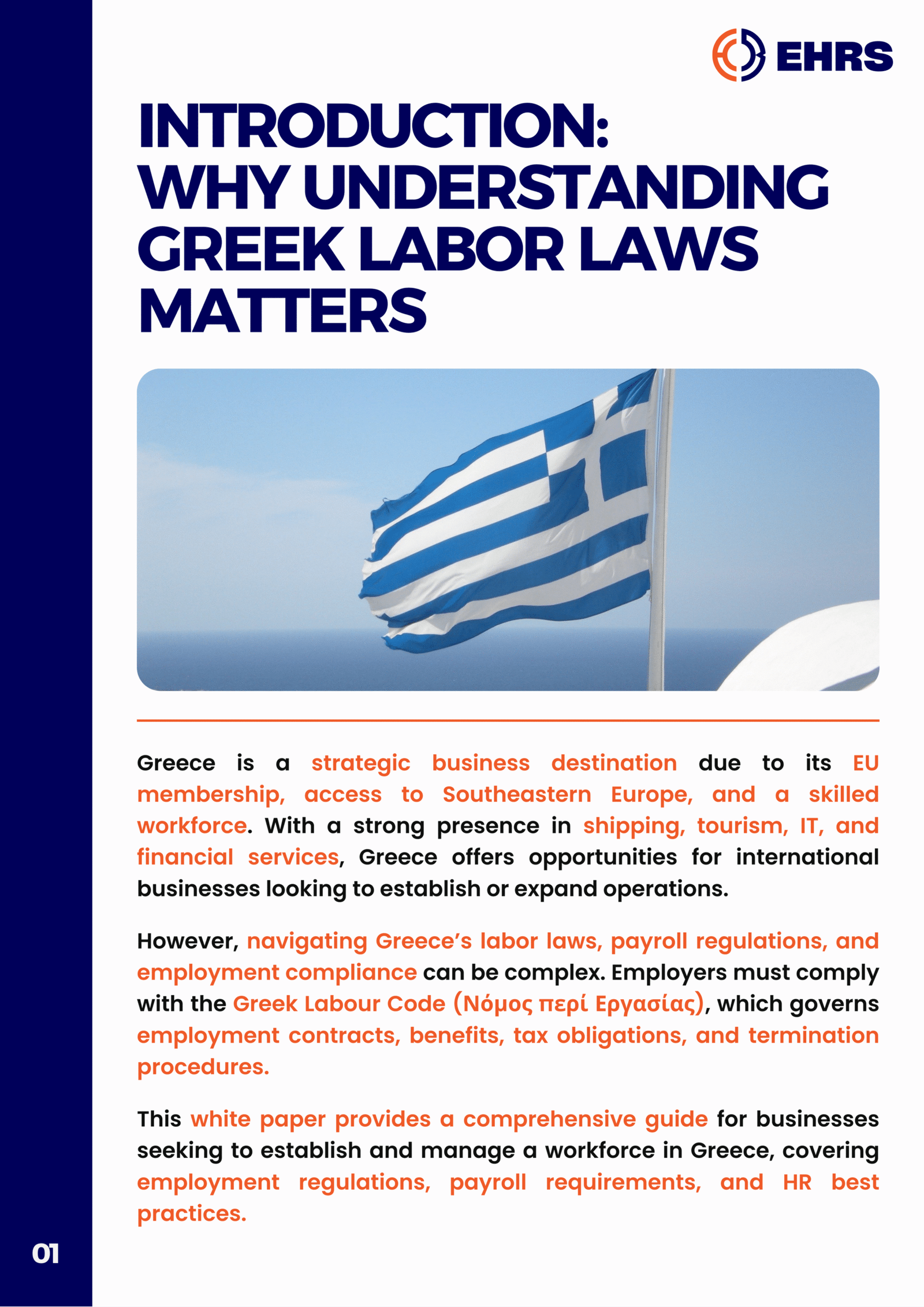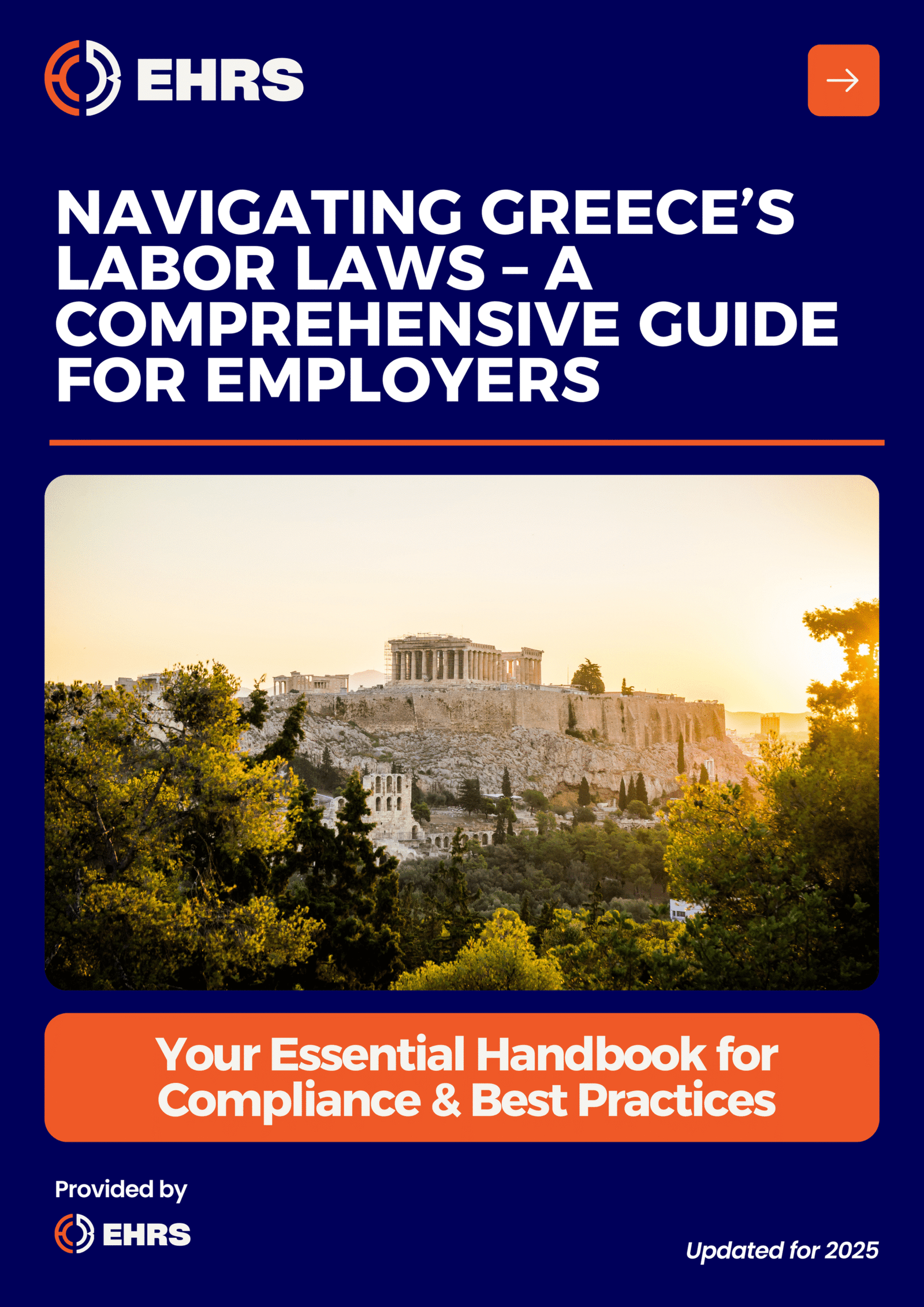GREECE
List of countries
HR Services for Greece
Hire in Greece without opening a local entity. We manage employment contracts in compliance with Greek labor law, handle social insurance and tax registrations, oversee payroll, and ensure adherence to local regulations. With our expert HR services for Greece, your business can expand confidently while staying fully compliant.
According to the U.S. Department of State, Greece has shown strong economic recovery in recent years, with consistent GDP growth, reduced unemployment, and increased investor confidence. As a member of the European Union and Eurozone, Greece offers access to the single market and a strategic location at the crossroads of Europe, Asia, and Africa. Key sectors such as tourism, logistics, energy, and IT services have attracted growing interest from U.S. and international investors. The Greek government continues to implement reforms aimed at improving the business environment and streamlining bureaucracy.
However, HR operations in Greece can be complex for U.S. and UK companies unfamiliar with the country’s detailed labor laws, collective bargaining agreements, and social security obligations. Employment contracts must be registered digitally and conform to specific legal standards, while employers must comply with strict rules on terminations, leave, and working conditions. Navigating these requirements without local expertise can lead to compliance risks and administrative delays. By outsourcing HR to a trusted partner like EHRS, companies can streamline their market entry, ensure legal compliance, and manage contracts, payroll, and employee documentation in full alignment with Greek and EU labor regulations.
ALL YOU NEED TO KNOW ABOUT
HR OUTSOURCING IN GREECE
GREEK EMPLOYMENT
REGULATIONS TO KNOW
THE BENEFITS OF
EXPANSION IN GREECE
THE CHALLENGES OF
EXPANSION IN GREECE

Check our free HR guide to help you quickly improve your HR in Greece
FAQ for Greece
Learn more about Greece
Free Download
Request your free guide and receive it immediately

All You Need to Know About Outsourcing
Your HR in Greece with EHRS
Full-Scope HR Management
EHRS provides end-to-end HR outsourcing in Greece, covering employment contracts, payroll, onboarding, leave management, and regulatory filings. Our expert HR services for Greece ensure your local HR function is compliant, efficient, and ready to scale.
Expertise in Greek Labor Law
Greek labor regulations are shaped by national law and collective agreements, with detailed requirements on terminations, notice periods, and employee rights. EHRS navigates these complexities for you, reducing legal risk and ensuring compliance.
Flexible and Cost-Effective HR Solutions
Building an internal HR department in Greece can be time-consuming and costly. EHRS delivers scalable HR support tailored to your company’s growth stage—perfect for startups, expanding SMEs, and global teams.
Greek Employment Regulations to Know
Employment Contracts
All employees in Greece must receive a written employment contract, outlining job role, salary, working hours, and notice periods. As part of our comprehensive HR services for Greece, we ensure all contracts are properly prepared and filed electronically with the ERGANI system before the employee begins work.
Working Hours & Leave
The standard workweek is 40 hours, though collective agreements may impose lower limits. Employees are entitled to a minimum of 20 working days of paid leave per year, plus national public holidays.
Social Security Contributions
Employers must register with EFKA (Unified Social Security Fund) and contribute to pension, healthcare, and unemployment insurance. Monthly reporting and timely payments are essential to avoid penalties.
The Benefits of Expansion in Greece
Access to EU, Balkans, and MENA Markets
Strategically located at the crossroads of Europe, Asia, and Africa, Greece offers strong connectivity to regional markets and shipping routes, making it an ideal base for Southeast European expansion.
Skilled, Affordable Workforce
Greece offers a highly educated labor force, particularly in sectors like IT, engineering, and finance. Labor costs remain competitive compared to Western Europe, offering value for international employers.
Improving Business Climate
The Greek government continues to implement pro-business reforms and digitize public services. Combined with EU and Eurozone membership, this creates a stable and transparent environment for investment.
The Challenges of Expansion in Greece
Labor Law Complexity
Greek labor laws and collective agreements are highly detailed, especially around dismissals, severance pay, and working time flexibility. Non-compliance can result in significant fines or legal disputes.
Bureaucratic Procedures
Despite ongoing digitization efforts, administrative processes—such as employee registrations and labor filings—can still be time-consuming and require local knowledge.
Documentation & Language Requirements
All official HR documentation and filings must be in Greek. Contracts must be legally valid and culturally appropriate, making accurate translation and legal review essential.
Talk to an HR specialist about payroll, compliance, and audits today.
Expand into Greece with confidence.
Most Asked Questions
About Greece
Why do I need a written employment contract in Greece? Aren’t verbal agreements valid?
While verbal agreements can be valid under Greek labor law, written contracts are mandatory for certain employment types, such as fixed-term or part-time contracts. Without a written agreement, disputes can arise, leading to fines or legal challenges.
Why It’s Risk-Free: We draft compliant contracts that protect your business and ensure clarity for both you and your employees.
Do I really need to track working hours in Greece? Isn’t flexibility more practical?
Greek labor law mandates the recording of working hours, including overtime. Employers must also report work schedules to authorities electronically. Non-compliance can result in fines.
Why It’s Risk-Free: We help you implement compliant time-tracking systems, balancing flexibility and adherence to Greek labor regulations.
How much annual leave do I need to provide? Isn’t the statutory minimum enough?
Employees are entitled to a minimum of 20 working days of paid annual leave for a 5-day workweek, increasing with tenure. Public holidays are also mandatory. Offering only the minimum might harm retention.
Why It’s Risk-Free: We create competitive leave policies that comply with Greek law while supporting employee satisfaction and retention.
Parental leave in Greece seems extensive. How can I maintain productivity during employee absences?
Greece offers generous parental leave, including up to 4 months of unpaid leave for each parent. Temporary hires and workforce planning can mitigate disruptions.
Why It’s Risk-Free: We assist with leave planning and compliance, helping you balance operational stability and employee needs.
Are collective agreements (CAs) mandatory in Greece? Can’t I set my own policies?
Collective agreements are binding in certain industries and can override individual employment contracts. Ignoring them may result in non-compliance penalties.
Why It’s Risk-Free: We identify applicable CAs and align your policies with Greek labor standards to ensure compliance and avoid conflicts.
How do payroll taxes work in Greece? What happens if I make a mistake?
Employers must deduct income tax, social security contributions, and other mandatory payments. Errors in payroll can lead to audits and penalties.
Why It’s Risk-Free: We manage payroll compliance, ensuring accurate deductions and timely filings with Greek authorities.
Do I need to focus on health and safety in Greece? Isn’t this just standard practice?
Employers must comply with Greece’s health and safety laws, which include conducting regular risk assessments and implementing preventive measures.
Why It’s Risk-Free: We provide risk assessments and safety policies, keeping your workplace compliant and protecting your employees.
Is compliance worth the cost? Won’t it just increase my overheads?
The cost of non-compliance—fines, legal disputes, and employee turnover—far exceeds the investment in proactive compliance. It also builds trust with employees and stability for your business.
Why It’s Risk-Free: We streamline compliance processes, saving you time and money while ensuring smooth operations.
Are probation periods necessary? Can’t I just terminate employees who don’t perform?
Probation periods allow for easier termination during the trial phase and typically last up to 12 months for indefinite-term contracts. Without a probation period, dismissals must follow stricter legal procedures.
Why It’s Risk-Free: We structure probation periods that align with Greek labor law, giving you flexibility while minimizing risks.
Is overtime pay mandatory? Can’t I just offer extra time off?
Overtime in Greece must be compensated at 120%-150% of the regular hourly wage or substituted with time off if agreed upon. Mismanagement of overtime can lead to wage disputes or penalties.
Why It’s Risk-Free: We design overtime policies that comply with Greek labor laws, ensuring fairness and avoiding costly claims.
Do I need to pay employees during sick leave? Isn’t this covered by social insurance?
Employers must pay sick leave for the first 3 days of absence, while social security covers extended periods. Accurate documentation is critical to avoid compliance issues.
Why It’s Risk-Free: We manage sick leave processes and filings, ensuring compliance with Greek regulations and minimizing your administrative workload.
Termination laws in Greece sound restrictive. What if I need to reduce staff quickly?
Terminations must follow Greek labor law, which requires valid reasons, notice periods, and severance payments. Failure to comply can result in legal claims or penalties.
Why It’s Risk-Free: We guide you through lawful termination processes, minimizing risks while protecting your business from disputes.
Are pensions mandatory in Greece? Isn’t salary enough to retain employees?
Employers must contribute to the national social security system, which includes pensions. Offering additional pension benefits can enhance employee loyalty.
Why It’s Risk-Free: We ensure compliance with pension contributions and help design attractive packages to retain talent.
Can I hire non-EU workers in Greece? Isn’t the process too complicated?
Hiring non-EU workers requires a residence and work permit. Employers must prove the role cannot be filled by an EU citizen. Delays or errors can impact timelines.
Why It’s Risk-Free: We handle the permit process, ensuring compliance and smooth onboarding for international hires.
What happens if I fail a compliance audit in Greece? Could it disrupt my operations?
Non-compliance can lead to fines, operational restrictions, or reputational damage. Labor inspections often focus on contracts, payroll, and health and safety compliance.
Why It’s Risk-Free: We proactively review your HR policies and practices, ensuring compliance and audit readiness.



